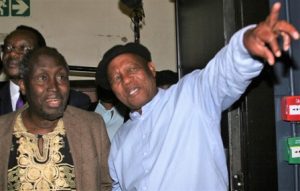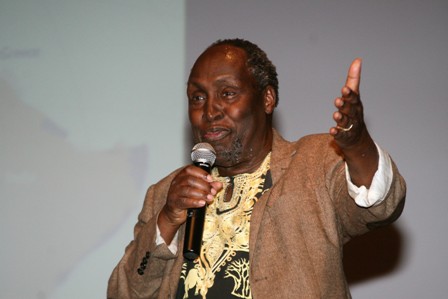
Jointly hosted by the National Institute for Humanities and Social Sciences, Wits University and Professor Xolela Mangcu – the celebrated Kenyan author and academic delivered a public lecture last Thursday, at Wits University’s Great Hall, entitled Decolonise the Mind, Secure the Base, where he unpacked hidden facts and tackled distortions about the Africa.
Considered the founding father of decolonialisation discourse, Wa Thiong’o, who coined the term “decolonising the mind” following his 1986 book “Decolonising the Mind: the Politics of Language in African Literature”, holds the title of Distinguished Professor of the Departments of Comparative Literature and English at the University of California, Irvine. He has written two autobiographical works, “Dreams in a Time of War: a Childhood Memoir” and “In the House of the Interpreter: A Memoir”, in addition to a collection of seminal texts foundational to the decolonisation school of thought and fiction.
The university’s Great Hall 1000+ seating was filled beyond capacity, with many people left standing or taking up seats at two spill over spaces. Of an audience composed of an eclectic mix ranging from high school to tertiary level pupils, some notable others who attended included the EFF’s Julius Malema and Mbuyiseni Ndlozi [an alumni of the institution], sculptor, Professor Pitika Ntuli, poets, Maishe Maponya and Kgafela oa Magogodi and actor, Khulu Skenjana.
Wa Thiong’o began his lecture explaining that to understand the world and Africa’s place in it, “we must understand ourselves”. He developed this idea with facts about Africa’s geographical size relative to the size of the former colonial powers. The former colonial countries all fit into Africa, and yet, the geographical maps of the early colonial cartographers depict Africa as smaller and less significant. He spoke about the language of “tribe” versus “nation”.
Setting the scene, wa Thiong’o began by sharing his experience of South Africa under apartheid, a time when he was not allowed in the country.
He proceeded to confront myths about Africa starting with the geographic size of the continent.
Almost all of the nations of the world can fit into the African continent and yet, for centuries Africa has been portrayed as a small continent on the conventional world map said the multi-decorated theorist of post-colonial literature. This is a deliberate distortion to make Africa invisible.
Wa Thiong’o praised black South African intellectuals, such as Peter Abrahams amongst others, who have contributed to African writing. Of myths and facts, he argued that Africa has been a donor to the West for centuries through its plundered resources and skills. “For over 500 years Africa has been the donor to the world, rather than merely aid recipient as framed in West.”
The African scholar argued that language is at the centre of decolonisation. Wa Thiong’o took a swipe at Africans who are unable to speak their mother tongue. His statements on accents and access received loud applause from the audience in the packed Great Hall.
“Colonialists gave us their accents in exchange for access to resources in Africa.”
“While African leaders perfect their borrowed accents, Europeans sharpen their tools to access our resources.”

“How are 300,000 Icelanders a nation, but 40 million Yoruba are tribesmen?” he asked.
Knowledge of mother tongue is empowerment; lack of knowledge is enslavement, said the multi-decorated professor. A champion for the development of African languages, wa Thiong’o called on African intellectuals and the students to put more urgency in the institutionalisation of African languages.
African scholarship has achieved great visibility in the world but not in Africa itself as their thoughts are only written in English. This is the opposite of what was envisioned by Nkwame Nkrumah who led Ghana to independence from Britain, asserted wa Thiong’o.
The following are some of the most notable points he delivered:
1. “We must be careful with the vocabulary that defines us … to not internalise the negativity.”
2. “Let us call people by what they call themselves.”
3. “…Black intellectual tradition has given so much to the rest of the world … but this is often invisible”.
4. “African languages are not on a lower rung on a ladder to an English heaven…
5. Use English… but don’t let English use you…”
6. “In colonial conquest, language did to the mind what the sword did to the bodies of the colonised”
7. “Accents for access: … While African leaders perfected their accents, Europeans sharpened tools for access to their [Africa’s] resources”
8. “It is not African languages that threaten English. But postcolonial African policy makers will often insist that they do.”
9. “If you know all the languages of the world but not your mother tongue, that is enslavement. Knowing your mother tongue and all other languages too is empowerment.”
Student activist and feminist Simamkele Dlakavu delivered the response to the main address.
Wa Thiogo’s visit has been hailed as timely given the raging discussions on the decolonisation of universities and the call for curriculum reform.

